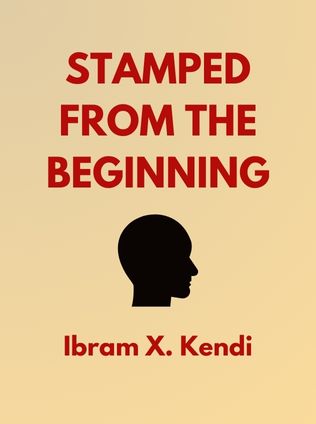
Stamped from the Beginning
The Definitive History of Racist Ideas in America
By Ibram X. Kendi
Published 03/2016
About the Author
Ibram X. Kendi, an influential American historian and author, has dedicated his career to exploring and addressing the roots and consequences of racism in the United States. Born in 1982, Kendi has emerged as a leading voice in the discussion of race, particularly through his works such as "How to Be an Antiracist" and "Stamped from the Beginning," the latter of which won the National Book Award for Nonfiction in 2016. Kendi’s work is marked by its rigorous historical research and its accessible writing style, making complex theories of racism understandable to a broad audience. In "Stamped from the Beginning," Kendi challenges conventional views on racism, offering a powerful re-examination of American history through the lens of racist ideas and policies. His goal is to not only inform but also to empower readers to recognize and combat the enduring impact of racism in society.
Kendi's personal experiences have deeply influenced his work. Growing up in a predominantly White neighborhood, he faced the complexities of race and identity from a young age. These experiences, combined with his academic background, have fueled his commitment to uncovering the roots of racial inequality. Kendi holds a Ph.D. in African American Studies and is a professor at Boston University, where he also serves as the founding director of the Boston University Center for Antiracist Research. His work is not just about understanding history; it’s about using that understanding to drive social change. As a public intellectual, Kendi has become a prominent figure in national conversations about race, regularly contributing to major publications and engaging in public speaking to advocate for antiracist policies and practices.
Main Idea
"Stamped from the Beginning" is a comprehensive exploration of the history of racist ideas in the United States, challenging the traditional narrative that racism stems from ignorance and hatred. Kendi argues that the opposite is true: racist policies and practices were established out of economic and political self-interest, and racist ideas were created later to justify these policies. The book is an in-depth analysis of how these ideas have evolved over time and continue to influence society today. Kendi's work is not just an academic exercise; it is a call to action, urging readers to understand the roots of racism so that effective solutions can be developed to combat it.
The main thrust of Kendi's argument is that understanding racism requires a reversal of the commonly held belief that racist ideas precede and cause discriminatory actions. Instead, Kendi presents the notion that discriminatory policies come first, often driven by economic and political goals, and these policies subsequently generate racist ideas to justify their existence. This perspective is essential for anyone looking to understand how racism functions and persists in modern society. It challenges readers to reconsider the ways in which racism is addressed, suggesting that the focus should shift from changing individual attitudes to dismantling the systemic policies that uphold racial inequality.
Kendi also delves into the complex relationship between racism and the concept of race itself, arguing that race is a social construct rather than a biological reality. This understanding is crucial because it highlights the arbitrariness of racial categories and the way they have been manipulated throughout history to serve the interests of those in power. By tracing the history of racist ideas, Kendi demonstrates how these ideas have been used to justify everything from slavery and segregation to mass incarceration and economic disenfranchisement. He also explores how racist ideas have been internalized by both oppressors and the oppressed, leading to a cycle of perpetuation that is difficult to break.
Table of Contents
- A New Theory of Racism
- The History of Racist Thought in America
- Fighting Racism: From Theory to Action
A New Theory of Racism
Kendi begins "Stamped from the Beginning" by presenting a revolutionary theory of racism that turns conventional wisdom on its head. He argues that instead of racist ideas leading to racist policies, it is racist policies that give birth to racist ideas. These policies were often created to benefit economic or political interests, and then racist ideas were developed to justify these policies and make them more palatable to the public. Kendi explains that this understanding is crucial for developing effective strategies to combat racism because it shifts the focus from trying to change minds to changing the policies that create and sustain racial inequalities.
This theory is built on the idea that racism is not simply the result of individual ignorance or hatred, but rather a tool used by those in power to maintain their economic and political dominance. Kendi traces this dynamic back to the early days of the African slave trade, where economic interests in exploiting African labor led to the creation of ideas about Black inferiority. These ideas, in turn, were used to justify the brutal realities of slavery, creating a feedback loop that reinforced both the policies and the ideas. By understanding this process, Kendi argues, we can begin to see how modern forms of racism are similarly rooted in policies that benefit certain groups at the expense of others.
Defining Racism and Race
Kendi defines racism as any idea that suggests one racial group is superior or inferior to another. This definition is broad, encompassing not only overt acts of hatred but also more subtle forms of bias that often go unrecognized. According to Kendi, race itself is not a biological reality but a social construct designed to enforce hierarchies and justify inequalities. Understanding these definitions is key to recognizing how deeply embedded racism is in American society and how it has been perpetuated over centuries. Kendi’s definition challenges readers to reconsider their own assumptions about race and racism, urging them to look beyond individual acts of discrimination to the systemic forces that shape societal attitudes.
Sign up for FREE and get access to 1,400+ books summaries.
You May Also Like
Freakonomics
A Rogue Economist Explores the Hidden Side of Everything
By Steven D. Levitt and Stephen J. DubnerI Am Malala
The Story of the Girl Who Stood Up for Education and Was Shot by the Taliban
By Malala Yousafzai



















